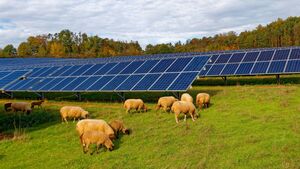Concerns raised over solar farm near Kildare/Carlow border

Photo for illustrative purposes
“IRELAND does not have a land-use policy in place,” a crowd of around 60 people gathered near the Kildare/Carlow border heard last week.
The gathering in Walshe’s Bar, Killerig, Co Carlow on Wednesday was an informal event aimed at giving people an opportunity to outline concerns about solar projects in the area and was organised by engineer and local man Fergal McGrath.
In July, plans were lodged with the county council for a large solar farm in the locality.
Lightsource Renewable Energy Ireland Limited is seeking planning permission for Solar PV Energy Development, along with an associated battery energy storage system (BESS) compound on a 326-acre site on lands in Straboe and Killerig. While initially sought for a ten-year period, there is a proposed 40-year operational period.
According to Fergal, if this development gets the go ahead, almost 1,000 acres of land in the vicinity could be used for solar energy, as permission has already been granted for 170-acre and 190-acre site developments, while a further 225-acre site is under consideration.
“That’s a lot of coverage of good land in a small community,” he said.
It’s his view that Ireland can meet solar energy targets by tapping into the potential of rooftop panels.
“Every social house in the country, every government building, every council should have solar on the roofs,” he said.
He also argued that we should look to our Italian counterparts, who have banned large-scale solar developments on farmland.
“The size and scale of these projects are just too big. We need to preserve our green belts, our natural heritage and biodiversity,” he said, referencing the proximity of this proposed development to the historic Duckett’s Grove.
All five local area public representatives were present, as well as some from neighbouring parts of the county and Fine Gael general election candidate Catherine Callaghan, who vowed to take the concerns raised to taoiseach Simon Harris.
Questions and comments were generated, including the potential impact on house values, the cost of decommissioning, implications for health, taxation and succession. The need for renewable energy wasn’t in dispute, and although Fergal told the meeting he respected the IFA’s position that farmers were entitled to use their land as they see fit, some in the crowd were heavily critical of the farming body.
“When are we going to start valuing farmers as guardians of the land? Land that’s breathing and has biodiversity. Not the industrialisation of the Irish countryside,” noted one person.
Another person said: “15 power cuts in this area last year and one of them lasted for three days. Government policy will come when it’s all done and dusted. Farmers are farming here and not getting a living, a wage, so why not?”
Cllr Charlie Murphy told the meeting that the IFA’s policy is that “landownership is sacred. We need to remember the farmer’s point of view. The price of crops isn’t going to cut it”.
Cllr Jim Deane said: “We are all very rural … close-knit people that have kept our areas alive.” He said that developments such as these have the potential to “pit people against each other – neighbours are having to decide if they object against their neighbours”.
Cllr Brain O’Donoghue wanted to know if the company had done any consultation with the local community.
Fergal said a public meeting had been held, but that a lot of time “has lapsed since that consultation, and when the application went in a year later”.
Anthony McNulty of the Protect Moylisha Hill group said taking land out of circulation has impacts on a community.
“Farm families are the lifeblood of communities. If we can’t give sites to young people, if new people coming into an area can’t build, then we might not have people to regenerate areas,” he said.
He went on to say: “We’ve encouraged a race to the bottom. The government have allowed and encouraged the destruction of rural Ireland.”
Another local woman present commented: “We’re supposed to be Ireland’s Ancient East, and what are we doing? Covering it in panels.”
Fergal said Ireland needs to adopt the UK model of grading land and making certain areas ‘no-goes’.
Colm Byrne, who has worked in the solar energy area for 22 years, said that “land-based solar has potential and I’m certainly not against it, but it definitely doesn’t need to go on good land. We need a review of government policy and there is a strong case for a moratorium on developments to be put in place”.
Fergal ended the meeting by noting the issue is divisive but not personal and encouraged those interested to make a submission to Carlow County Council prior to the 14 August. A final decision on the project is due on 4 September.





